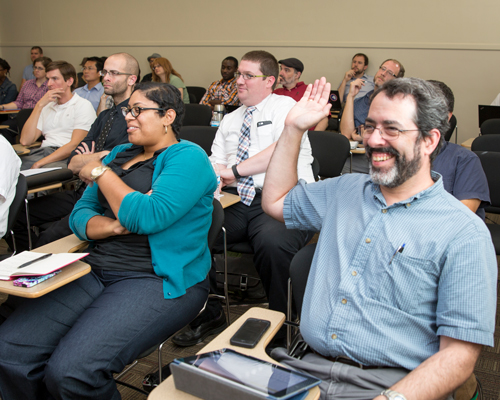
The instructional culture in the College of Arts and Sciences acknowledges the varied processes by which students gain knowledge and encourages active involvement in the learning process.
The Reflective Teaching Workshop provides resources — workshops, technology, peer support, and outreach efforts — to help faculty build learning environments that strengthen the capacity of students to gather and synthesize information and develop robust critical thinking skills across disciplines and in a variety of educational settings.
Faculty members within the College participate in workshops offered during the fall semester and carrying over into the first weeks of the spring semester.
Workshop Overview
The three-session workshop is designed to encourage an organic approach to the challenges of teaching and learning in the wide array of disciplines within the College of Arts and Sciences that encourages the centrality of active learning — a simple philosophical ideal that encourages learning environments that demand active engagement with material as opposed to passive receivers of information. The concept applies equally to traditional classrooms as well as online environments and is workable in a variety of disciplines and classroom sizes.
The learning outcomes are tied to the progression of workshop topics. By the end of the sessions, a participant will demonstrate a capacity
- To identify a student skill set appropriate to a specific course that overlaps (or corresponds to) skills required in the related discipline.
- Create measurable learning outcomes suitable for the pedagogical variables of a specific course.
- Identify course-specific topics or concepts for which an active learning method would improve student learning.
- Propose active learning methods aligned with learning outcomes and standards of assessment reporting.
- Formulate an assessment plan meeting the standards established by the College of Arts and Sciences.
Facilitators
Patrick Frantom
Patrick Frantom is an assistant professor of chemistry. He earned his BS degree in biochemistry at Louisiana State University (1999) and his PhD in biochemistry at the Texas A&M University (2005). Following a postdoctoral research fellowship at Albert Einstein College of Medicine, he began his independent research career at The University of Alabama in 2009.
He teaches upper-level biochemistry courses and large-lecture format general chemistry. His research interests focus on identifying structure/function relationships used to create catalytic and regulatory diversity in a conserved protein fold.
In 2013, he received an Early Career Development Award from the National Science Foundation to support his research project as well as the development of a new upper-level biochemistry laboratory course based on original, hypothesis-driven experiments.
Teaching Statement
High-level cognitive skills, such as evaluating raw data or creating novel content, are increasingly valuable in today’s economy and a hallmark of higher education. In contrast to lower-level skills, which include identifying or memorizing, high-level skills are difficult to learn from passive teaching styles. To become proficient in higher-level skills, students must first have an opportunity to practice them in a safe environment and receive feedback on their performance. Incorporation of active learning techniques into the current curriculum provides a simple mechanism to accomplish these two steps and has the potential to improve student learning and retention. When active learning approaches are aligned with well-thought-out learning outcomes, students are presented with a clear picture of what is expected to succeed in a specific course.
Jessica Kidd
Jessica Fordham Kidd is a clinical/lecture-track faculty member of the English department, where she serves as associate director of the first-year writing program. Jessica has a BS in geology and an MFA in creative writing with a specialization in poetry, both from The University of Alabama.
She teaches the pedagogy and practicum course for first-year writing GTAs along with freshman composition, creative writing, and the occasional literature course. She also teaches a special section of Fine Arts for Engineering students that focuses on experimental arts as a way of increasing students’ fluency in and comfort with their own creativity.
Jessica has written articles for Alabama Heritage Magazine and the online Encyclopedia of Alabama. Her poetry has appeared in The Paris Review, Drafthorse, and Eye to the Telescope, among others.
Teaching Statement
I believe in the validity of my students’ experiences, and I strive to let those experiences find a voice in my classroom. My job is to facilitate the expression of students’ previous and emerging knowledge and to give them new experiences to increase their knowledge and comfort in the academic discourse community. Active learning principles are vital to what I do — letting students work in the classroom and facilitating collaboration both between students and between teacher and students. In a writing classroom, I provide opportunities for students to try new ways of organizing, expressing, and revising their ideas. In the fine arts course, students create their own projects as a means of grappling with course concepts.